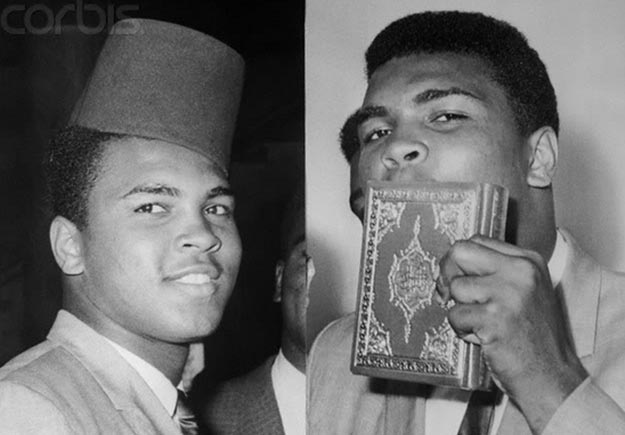Hawzah News Agency-Boxing legend condemned Donald Trump's proposed ban on Muslims entering US in one of his final public statements
Muslims in the US and around the world are taking to social media to pay tribute to Muhammad Ali, the legendary boxing champion and political activist who made headlines around the world when he converted to Islam in 1964.
Ali, who died on Friday aged 74 in Arizona, was born Cassius Clay but changed his name to Muhammad Ali two days after knocking out Sonny Liston to claim at the age of 22 the heavyweight world title and declaring himself “the greatest”.
Ali initially joined the Nation of Islam, the fringe sect popularized among African-Americans by Malcolm X that was involved in the struggle for civil rights, but he later embraced mainstream Islam after making the hajj pilgrimage to Mecca in 1972.
“Muhammad Ali probably is the first face of Islam in America, the first notice being taken that there are Muslims in America,” Ihsan Bagby, a professor of Arabic and Islamic Studies at the University of Kentucky, told the Courier-Journal newspaper.
Ali was also an articulate campaigner for civil rights and was stripped of his world heavyweight title and sentenced to five years in prison in 1967 after refusing to fight in the Vietnam War. He later went on to reclaim the world title two times, the first person to do so.
He remained politically active throughout his life and in December issued a statement condemning US presidential contender Donald Trump's proposal for a ban on Muslims entering the US in the aftermath of the San Bernardino shootings by a Muslim couple who claimed allegiance to the Islamic State group in California.
“I am a Muslim and there is nothing Islamic about killing innocent people in Paris, San Bernardino, or anywhere else in the world. True Muslims know that the ruthless violence of so called Islamic Jihadists goes against the very tenets of our religion,” said Ali.
"We as Muslims have to stand up to those who use Islam to advance their own personal agenda. They have alienated many from learning about Islam. True Muslims know or should know that it goes against our religion to try and force Islam on anybody.
"Speaking as someone who has never been accused of political correctness, I believe that our political leaders should use their position to bring understanding about the religion of Islam and clarify that these misguided murderers have perverted people's views on what Islam really is."
Arab-American novelist Saladin Ahmed said that Ali was possibly the "biggest star ever to publicly condemn the American war machine," referring also to one of the biggest music stars of the generation, John Lennon, an outspoken critic of the US war in Vietnam.
Ali might have been the biggest star ever to publicly condemn the American war machine, rivaled *maybe* by Lennon. That's not a small thing.
Nazem Kadri, a Canadian ice hockey player with the Toronto Maple Leafs, wrote: “Sad day. This man was iconic changed so many people's lives. The legacy will never die. Rest in peace champ”.
Linda Sarsour, a Palestinian-American civil liberties activist, wrote: “In a day and age where Islam is the most vilified faith, tonight the whole world is mourning a great man named MuhammadAli.”
He was PROUD to be Black AND Muslim. He loved his Blackness and his faith. He embodied confidence. Never let opposition break him.
"He represented the intersections of the movement. He was a Black Muslim American. He stood up against the status quo. He never surrendered," Sarsour also wrote.
Ali courted controversy at home in the US following his retirement from the ring in 1974 by embarking on a tour of the Middle East in which he visited two Palestinian refugee camps in southern Lebanon.
"In my name and the name of all Muslims in America, I declare support for the Palestinian struggle to liberate their homeland and oust the Zionist invaders,” Ali said at the time, prompting the Zionist newspaper Haaretz to observe that he had "frequently clashed with the Jewish people, accusing 'Zionists' of world domination, even as some notable members of the US Jewish community were his fervent admirers".
The paper recalled how in 1985 Ali had visited Palestine with the intention to "arrange for the freeing of the Muslim brothers imprisoned by Zionists," only for Zionist officials to politely rebuff his intervention.
But it also pointed out that Ali appeared to have mellowed in his views as he aged.
"Muslims, Christians and Jews all serve the same God. We just serve him in different ways. Anyone who believes in one God should also believe that all people are part of one family. God created us all. And all people have to work to get along."
Ali's influence was recognized beyond the US, with Moazzam Begg, the British former Guantanamo prisoner and human rights activist, describing him as a "huge inspiration" and posting a photo of himself meeting Ali in 1992.
Huge inspiration for me even before I met him in 1992. Only racists hated him, the rest loved him.
Ali was also praised for his work raising awareness about Parkinson's disease, for which he became a public symbol after being diagnosed with the debilitative condition in 1984.
"While Muhammad Ali is best known as one of the greatest athletes of our time, we will always remember him as one of the strongest fighters in the Parkinson’s community,” said Michael S Okun, medical director of the National Parkinson Foundation.
“The world owes him a great debt for raising awareness of the disease. He worked tirelessly to inspire people to better and more meaningful lives. Ali brought the critically needed international attention to Parkinson’s disease and this awareness served as the catalyst for advances in education, care and research. He lived as an example of a man who was not for a single day of his life defined by his disease.”
End.

